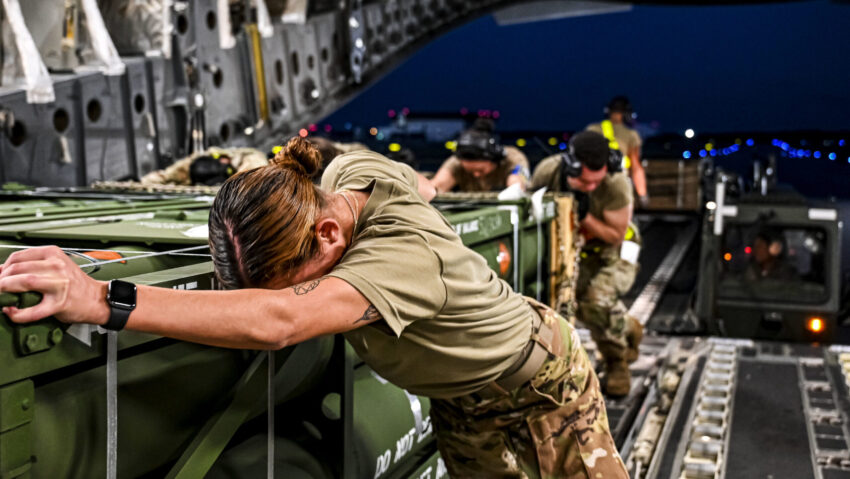Airmen assigned to the 305th Aerial Port squadron prepare the upload of Guided Multiple Launch Rocket System munitions to a C-17 Globemaster III at Joint Base McGuire-Dix-Lakehurst, N.J., Aug. 13, 2022. The munitions cargo is part of an additional security assistance package for Ukraine. (DVIDS)
Since taking office, Defense Secretary Pete Hegseth has made a grand show of using his red pen to cut what he describes as “wasteful” Pentagon spending. Whether that involves cutting $5.1 billion in contracts, trimming major Army programs, or cutting the number of general officers, Hegseth has made a point of shaking things up in the building.
There is no doubt that there is a ton of wasteful spending going on in the department that hampers its core mission of delivering cutting-edge capabilities to the U.S. military. So, in principle, I am all for fiscal discipline given its direct effects on national security. The question is whether Hegseth’s approach is the right one, which will only become clear with time.
But it’s not too soon to say that the defense secretary is ignoring an enormous source of waste: U.S. security cooperation (SC), authorized under Title 10 of the U.S. Code and temporarily through the annual National Defense Authorization Act. You want to make serious savings and support strategic objectives in U.S. foreign policy? DoD-administered security cooperation is where Hegseth should be looking.
We’re talking billions of dollars the United States gives every year to allies and partners around the world, some like Jordan, Oman, Lebanon, Ukraine, and Bahrain without clear strategic reasoning or proper evaluation. It’s not all bad, of course, but there is enough money involved to merit a thorough and strategic review, which we’ve never done.
I saw this autopilot spending approach firsthand when I served in the first Trump administration in the Office of the Secretary of Defense as the Director of security cooperation for the U.S. Central Command Area of Responsibility. I still see it today and probably will for the foreseeable future unless drastic changes are made to how we conduct both security cooperation and security assistance.
Given the large size of this enterprise (the FY 2025 budget that is proposed by the department for SC is $4.6 billion, but that total excludes a significant amount of money buried in various special programs, including the Ukraine Security Assistance Initiative and the Counter- Islamic State of Iraq and Syria Train and Equip Fund. Some programs like 127 Echo for counterterrorism also are classified), fixes can’t happen on the margins. They’ve been tried before, many times by successive administrations, and none has worked. This will require nothing less than structural surgery.
If Hegseth is serious about savings and maintaining America’s status as a partner of choice, he needs to push for the creation of a global security cooperation command. There are massive inefficiencies and few good results in U.S. security cooperation because nothing is integrated in the security cooperation community (including the geographic combatant commands), and there is no central management and coordination of security cooperation activities. A global command would fix those problems.
Give this new command a budget and the authority to organize, employ, train, equip and sustain a joint security cooperation force. In an ideal world, having a four-star general or admiral lead it would be best, but it has to be acknowledged that Hegseth is currently undergoing an effort to trim the general officer total at the Pentagon. So, while that may be the long-term solution, a start would be to have a senior civilian official in the Pentagon, perhaps a new Under Secretary of Defense for Security Cooperation, spin up the effort.
The priority is someone with the bureaucratic heft and political influence to instruct general officers to pursue courses of action that they might otherwise perceive as contradictory to their commands’ missions and priorities.
To be clear, I am not referring to U.S. security assistance, which falls under the jurisdiction of the State Department under Title 22 – that is a separate black hole and mountain of inefficiency. Perhaps in the future those funds and authorities could be transferred under this new position, but that is something for down the line. Right now, focusing on the Pentagon funds for security cooperation would be sensible.
Congress will have to get involved to create the new SC command (like it did when it created U.S. Special Operations Command in 1987) and possibly the new Pentagon civilian position. With their control of the Senate and majority status in the House, the Trump-led Republicans have a clear mandate to make big changes in government, and taking a critical eye at security sector assistance spending fits perfectly into President Trump’s agenda
Let’s keep finding savings at the Pentagon. Security cooperation is a key area where Hegseth should spend his time and energy.
Bilal Y. Saab is the Senior Managing Director of TRENDS US and an Associate Fellow with Chatham House.
Click this link for the original source of this article.
Author: Bilal Y. Saab
This content is courtesy of, and owned and copyrighted by, https://breakingdefense.com and its author. This content is made available by use of the public RSS feed offered by the host site and is used for educational purposes only. If you are the author or represent the host site and would like this content removed now and in the future, please contact USSANews.com using the email address in the Contact page found in the website menu.








